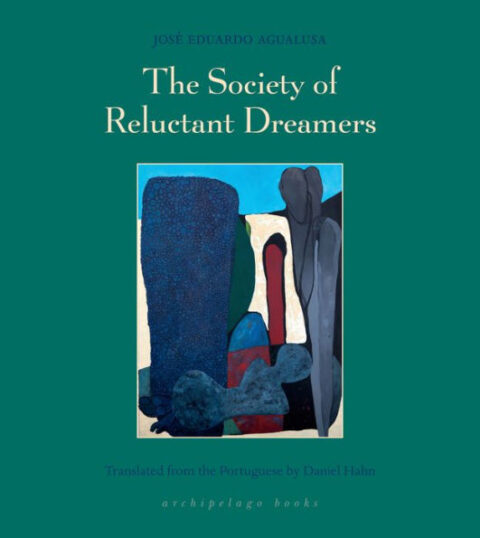For Angolan novelist José Eduardo Agualusa, his country’s history has been a wellspring of both inspiration and ambivalence. Following Angola’s independence from Portugal in 1975, it was subsumed by a nearly three-decade civil war, which Agualusa chronicled in his 2013 novel, A General History of Oblivion, shortlisted for the Man Booker International Prize. His latest novel to be translated into English, The Society of Reluctant Dreamers, follows the country’s fortunes into the recent past, which are less violent but hardly peaceful, as remnants of the pro- and anti-Communist factions still prosecute the country’s future. For Agualusa, the uncertain moment offers a perfect context to tell a story steeped in uncertainty, swimming in dreams.
 The lead protagonist of the story, Daniel, is a journalist who occasionally freelances for a Portuguese paper. This in itself is a problem: His wealthy father-in-law has threatened to scorch his career for involving himself with a “settler paper,” and in due time his family fractures. He’s in the process of divorcing his wife, and their 18-year-old daughter has been arrested for interrupting a presidential press conference by standing on a table and flinging blood-stained Monopoly money at him.
The lead protagonist of the story, Daniel, is a journalist who occasionally freelances for a Portuguese paper. This in itself is a problem: His wealthy father-in-law has threatened to scorch his career for involving himself with a “settler paper,” and in due time his family fractures. He’s in the process of divorcing his wife, and their 18-year-old daughter has been arrested for interrupting a presidential press conference by standing on a table and flinging blood-stained Monopoly money at him.
At first, Daniel is quick to bemoan his fate in conventional ways. “Every woman is a trap, that’s the truth of it,” he says. But being cast adrift from convention frees him to explore his political and personal crises in unusual ways. He befriends the owner of a coastal hotel, Hossi, a guerilla during the civil war who spins a tale about being abducted by Cuban soldiers and monitored for his capacity to intervene in others’ dreams. On the beach, Daniel discovers a camera that belongs to a Mozambiquan artist, Moira, who has made dreams a part of her work: “I dream, wake up, make a note of what I’ve dreamed and then I stage those dreams and include myself in them,” she writes him. And in her face Daniel sees a vague echo of a woman who’d haunted his prior dreams.
This is a peculiar way to frame a novel about situations where the stakes are so high — divorce, imprisonment, that legacy of a civil war — and in some ways The Society of Reluctant Dreamers feels like a narrative that’s been set on multiple thematic and emotional tracks that seem impossible to connect. It’s a romance about Daniel’s budding relationship with Moira, a political thriller about his daughter’s jailing and the hunger strike that threatens to kill her, an historical narrative concerned with Angola’s past ongoing tensions, all bundled in a surrealistic novel that clouds the intentions of Moira and Hossi, and makes much of ambiguous disappearances and shifting political loyalties.
 But though the concept is surrealistic, the writing isn’t — Agualusa (via Hahn’s steady translation from the Portuguese) treats its characters’ dreaming as a plot point as essential to the fate of the characters as any trial or act of violence. Agualusa partly means to equate dreaming to the intangible but essential feelings of hope that drive political change. Moira likens the dreams in the novel to a virus: “You broadcast your dreams, and some people, who are tuned in to receive those dreams. They dream those dreams.”
But though the concept is surrealistic, the writing isn’t — Agualusa (via Hahn’s steady translation from the Portuguese) treats its characters’ dreaming as a plot point as essential to the fate of the characters as any trial or act of violence. Agualusa partly means to equate dreaming to the intangible but essential feelings of hope that drive political change. Moira likens the dreams in the novel to a virus: “You broadcast your dreams, and some people, who are tuned in to receive those dreams. They dream those dreams.”
But dreaming, for Agualusa, isn’t strictly synonymous with hope or aspiration. Nor does it serve a bluntly Freudian purpose, where our real-life fears manifest strangely in our subconscious. Here, dreaming is more a reminder of human connection. Crowds and those who lead them often emerge in the dreams: The first one Daniel tells us about involves a naked woman in an amphitheater playing piano, occasionally firing a pistol in the air; he also recalls interviewing Muammar Gaddafi in a dream. Hossi, supervised by Communist soldiers, recalls dreaming of dead people: “all the dead talked to me of unrelated tomorrows, and of the stupidity of war.” Dreams are reminders of people, and of the violence they’ve suffered. Hence the eagerness of authorities to police them; hence the reluctance of the dreamers to fall asleep.
 Dreaming isn’t a means to escape reality, but to confront it — for Daniel, it’s an element of his psyche that forces him to reckon with the danger his daughter faces. And for Hossi, it’s the source of information about his past that his psyche has obscured. Political change is something that happens in public, but its roots are in the private places where imaginations can go unpoliced.
Dreaming isn’t a means to escape reality, but to confront it — for Daniel, it’s an element of his psyche that forces him to reckon with the danger his daughter faces. And for Hossi, it’s the source of information about his past that his psyche has obscured. Political change is something that happens in public, but its roots are in the private places where imaginations can go unpoliced.
Dreams tend to get short shrift in American fiction. Creative writing teachers tend to recommend avoiding them, because they’re too often used as bait-and-switch plot devices or simplistic metaphors. Agualusa falls into neither trap. By its conclusion, The Society of Reluctant Dreamers emerges as a kind of romance in the conventional sense — Daniel and the other leads enjoy a happy ending. But Agualusa suggests that such happily-ever-afters only come as a result of confronting the past, head-on or at the oblique angles of our dreaming.
[Published by Archipelago Books on March 10, 2020, 272 pp., $18.00 paperback. To acquire a copy from Bookshop.org, click here]
[To read our earlier review of Agualusa’s A General Theory of Oblivion, click here]